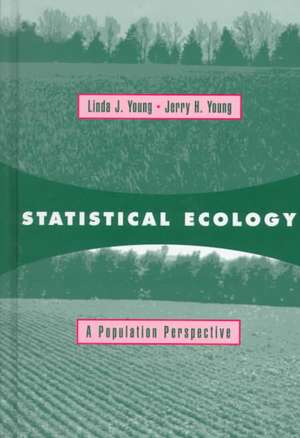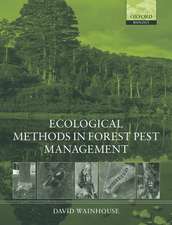Statistical Ecology
Autor Linda J. Young, Jerry Youngen Limba Engleză Hardback – 31 iul 1998
Unique to this book is a focus on ecological data for single-species populations, from sampling through modeling. Examples come from real situations in pest management, forestry, wildlife biology, plant protection, and environmental studies, as well as from classical ecology. All those using this book will acquire a strong foundation in the statistical methods of modern ecological research.
This textbook is for late undergraduate and graduate students, and for professionals.
| Toate formatele și edițiile | Preț | Express |
|---|---|---|
| Paperback (1) | 956.81 lei 6-8 săpt. | |
| Springer Us – 20 feb 2013 | 956.81 lei 6-8 săpt. | |
| Hardback (1) | 958.07 lei 6-8 săpt. | |
| Springer Us – 31 iul 1998 | 958.07 lei 6-8 săpt. |
Preț: 958.07 lei
Preț vechi: 1168.38 lei
-18% Nou
Puncte Express: 1437
Preț estimativ în valută:
183.33€ • 199.76$ • 154.48£
183.33€ • 199.76$ • 154.48£
Carte tipărită la comandă
Livrare economică 23 aprilie-07 mai
Preluare comenzi: 021 569.72.76
Specificații
ISBN-13: 9780412047114
ISBN-10: 041204711X
Pagini: 566
Ilustrații: XVI, 566 p.
Dimensiuni: 155 x 235 x 30 mm
Greutate: 0.81 kg
Ediția:1998
Editura: Springer Us
Colecția Springer
Locul publicării:New York, NY, United States
ISBN-10: 041204711X
Pagini: 566
Ilustrații: XVI, 566 p.
Dimensiuni: 155 x 235 x 30 mm
Greutate: 0.81 kg
Ediția:1998
Editura: Springer Us
Colecția Springer
Locul publicării:New York, NY, United States
Public țintă
ResearchCuprins
1: Probability Distributions.- 2: Goodness-of-Fit Tests.- 3: Models and Sampling.- 4: Sequential Estimation.- 5: Sequential Hypothesis Testing.- 6: Sequentially Testing Three Hypotheses.- 7: Aggregation and Spatial Correlation.- 8: Spatial Point Patterns.- 9: Capture—Recapture: Closed Populations.- 10: Capture—Recapture: Open Populations.- 11: Transect Sampling.- 12: Degree-Day Models.- 13: Life-Stage Analysis.- 14: Probit and Survival Analysis.- 15: Chaos.- References.













